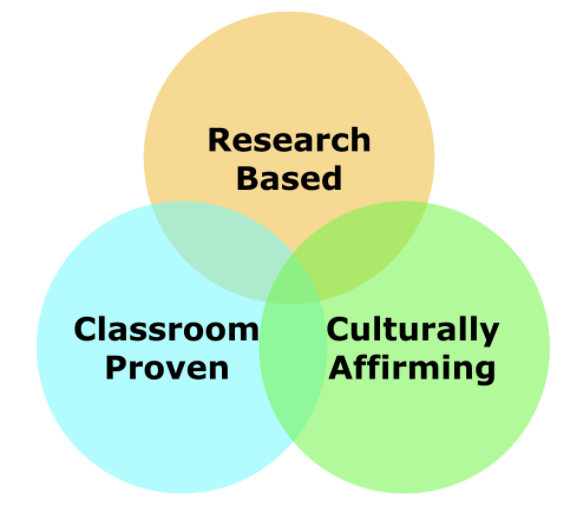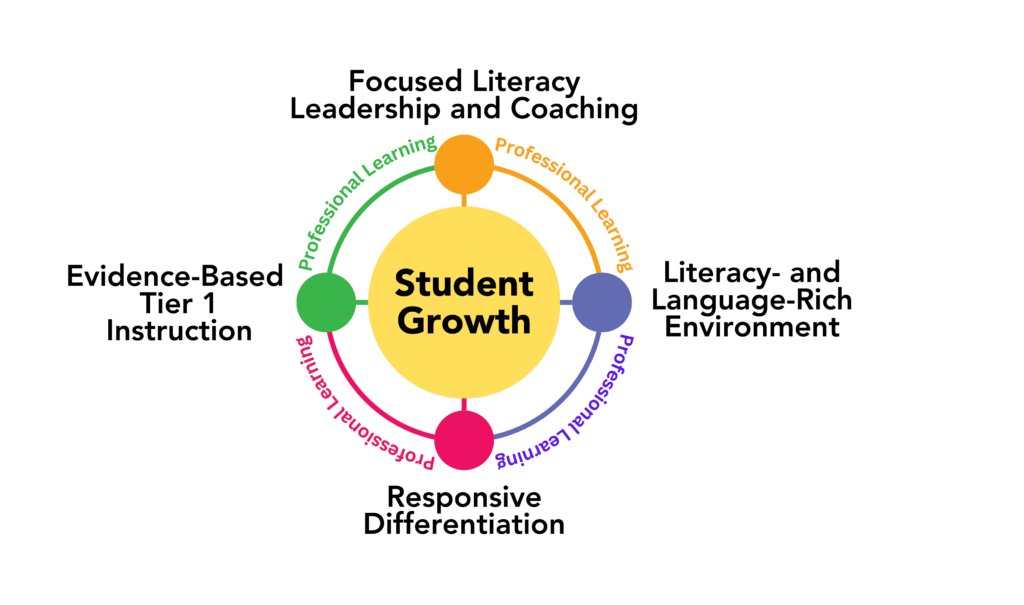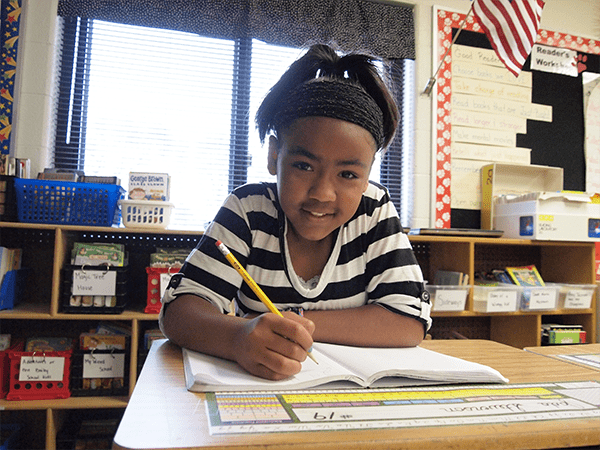Our core belief is best summed up in our motto:
Collaboration Creates Opportunity.
We believe there is no greater professional development than hands-on-practice and conversation in the company of engaged colleagues.

Under this umbrella, we come from different backgrounds, roles, and perspectives, but fundamental beliefs tie us together and inform the work we do with schools and educators.
The Educator Collaborative, LLC, is a think tank and educational consulting organization working to innovate the ways educators learn together. We aim to serve children and the adults who teach, learn, and grow alongside them.

Our expertise is in designing high quality, inspirational, and immediately practical professional learning that facilitates educators and leaders in strengthening research-based, classroom proven, literacy pedagogy. We provide site audits, workshops, and, most essentially, job-embedded professional development.
From our biannual, online conference day, “TheEdCollab Gathering,” which draws thousands of views from countries throughout the world, to intimate classroom-based labsites, we have supported thousands upon thousands of educators in developing literacy practices to meet the needs of students.
We aim to not just be “providers,” but members of the school family. We value building trusting, respectful, and collaborative relationships that last years.
Our work is internationally recognized and we are frequently called upon to consult, speak, and serve. We provide services to schools, literacy organizations, universities, and government bodies across the country and around the world. We are a trusted and experienced voice in literacy education, working with K-12 educators across urban, suburban, rural, charter, private, and international school settings.
Our research-based approach to educator professional development aims to build capacity within schools, districts, and networks, in which we work. As adults develop a deeper knowledge of literacy content, methods, assessment practices, and environment building, they are better equipped to plan for and respond to the developmental needs of the diverse, multilingual students in their care. Our whole-school approach includes supporting classroom teachers, instructional coaches, and leaders.
The organization serves to study, inquire, and grow along side the schools and educators we partner with. Our goal is to help you achieve your goals. We do not aim to push a product or force a rigid program, instead we aim to bring research and standards-aligned, best-practices to you and your team.
Our Model Supports Four Keys to Student Growth
For effective student growth in reading, writing, and language development, across subject areas, schools require focus and interaction between four key systems. Our professional development is designed to support each and their interconnectedness.
- Focused Literacy Leadership and Coaching
- Systems require streamlined and focused literacy leadership and expert instructional coaching.
- Literacy- and Language-Rich Environment
- Students require continuous opportunities to see, hear, speak, and compose literacy.
- Evidence-Based Tier 1 Instruction
- Ensuring our hard work as educators is the most effective and efficient as possible to support ALL students.
- Responsive Differentiation
- Structures and methods to make differentiation manageable and meaningful, including Tier 2 and specialist supports.

We are experts in providing rigorous, affirming, and practical professional development in the following literacy areas:
Standards Integration
- including Literacy Standards (e.g. CCSS); Content Standards (e.g. C3, NGSS); Teacher Effectiveness Frameworks; Technology Standards (e.g. ISTE); and Social Justice Standards
Literacy Content and Pedagogy
- Reading and Writing Instruction
- Foundational Skills
- Secondary Literature and Writing Instruction
- Literacy in the Content Areas
- Inquiry Pedagogy in Content Areas
- Differentiation for Students with IEPs
Anti-Bias and Anti-Racist Pedagogy
- Inclusive and Culturally Sustaining Pedagogy
- Social Justice Education
- Decolonizing Curriculum
Bi/Multilingual Pedagogy
- Teaching Multilingual Students
- Culturally Affirming Practices
Digital Literacy and Remote Learning
- Education Technology Integration with Literacy
- Media Literacy
- Moving Students from Content Consumers to Content Creators
- Remote Learning and Pedagogy
Literacy Leadership Methods
- Support for Administrators with Instructional Leadership
- Instructional Coaching: Training and Methods
Curriculum
- Curriculum Development
- Curriculum Review
We Learn from and Contribute to the Literacy Community
While not a complete list, some of the research base which informs our work:

Our belief in child and adolescent literacy development that highlights responsive, student-centered, and literacy rich classrooms (Allington, 2011; Atwell, 2014; Biancarosa & Snow, 2006; Graham & Perin, 2007; Graves, 2003; Kame’enui & Baumann, 2012; Ladson-Billings, 1995; Lehman, 2012; Lehman & Roberts, 2013; McCarthy, 2020; Miller, 2009; Mraz & Hertz, 2018; Sims Bishop, 1990; We Need Diverse Books, 2015),
our belief in language rich classrooms that are supportive and responsive to multilingual learners (Beneville, M. and Li, C., 2018; Cappellini, 2004; España and Yadira Hererra, 2020; Flores, 2018; Freeman, Freeman, & Mercuri, 2018; Nieto, 2013; Honigsfeld, 2019; Lesaux, N.K. & Geva, E, 2006; Moses, 2015; NCTE, 2008; WIDA, 2012),
our belief in digital media literacy skills that support students in making active meaning in today’s digital landscape (Benjamin, 2016; Common Sense Media, 2016; Davis, 2015; Hicks, 2015, 2014, 2013; ISTE, 2016; Light & Polin, 2010; Muhtaris & Ziemke, 2015),
and our belief in Culturally Sustaining Pedagogy that supports all children in linguistic, cultural, and social justice oriented growth through literacy teaching and learning (American Indians in Children’s Literature, 2006; Disrupt Texts, 2018; Kendi, 2019; Ladson-Billings, 1995; Lawrence-Lightfoot, 2004; Paris, 2012; Paris & Alim, 2017; Scott & Purdum-Cassidy, 2016; Sims Bishop, 1990; Teaching Tolerance, 2014; NCTE, 2015).
We help Lead the Literacy Community
Our network of literacy consultants bring a diverse background of experiences and share an ongoing love of learning and a dedication to giving back and strengthening our field. Among our members are best-selling authors, award-winning educators, teachers, coaches, district leaders, professors, and popular, trusted speakers. A purpose of The Educator Collaborative is to give back to our field and promote the next generation of literacy leaders. Our members contributions are making our literacy spaces—from classrooms to conferences—more inclusive, active, joyful, and responsive to the literacy needs of today’s students.
Our Members’ Research and Practice Have Appeared In
Harvard Educational Review, Journal of Adolescent and Adult Literacy, Teachers College Record, Education and Urban Society, Voices in the Middle, English Journal, NPR, SmartBrief, EdWeek, School Library Journal, Choice Literacy, Talks with Teachers, Teachers and Writers, School Library Journal, The Guardian, MiddleWeb, English Leadership Quarterly, Educational Viewpoints, New Jersey Council of Teachers of English Journal, NEA Advocate, International Journal for Critical Pedagogy, Reading Today and others.
Our Current And Past Members’ Books Inform Literacy Instruction
A great deal of research, informing not just our work but the work of literacy educators around the world, is found in the writing and practice of our current and recent literacy consultant members. Our internal Think Tank is a working, growing, responsive practice center, drawing on the practices, research, writing, and inspiration of our evolving membership. This is a collection of just some of the titles by current and past members.